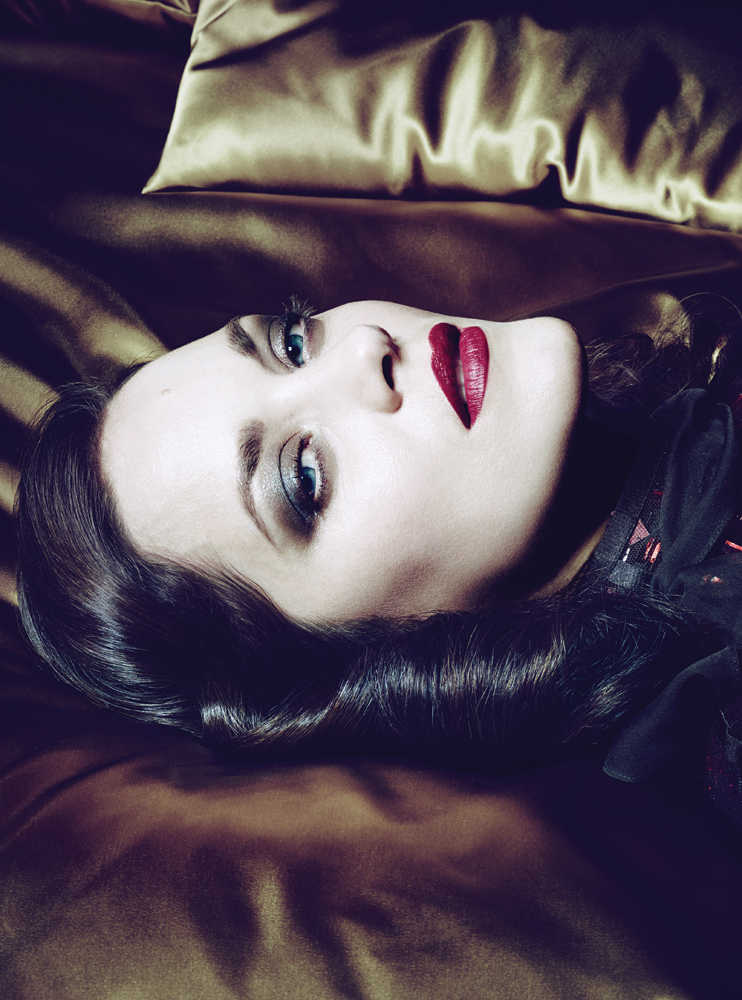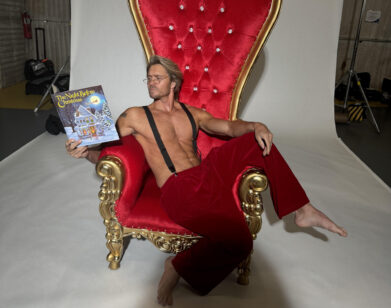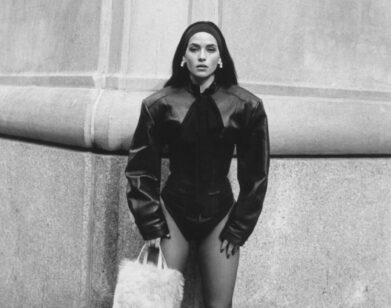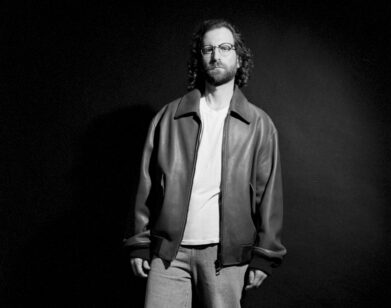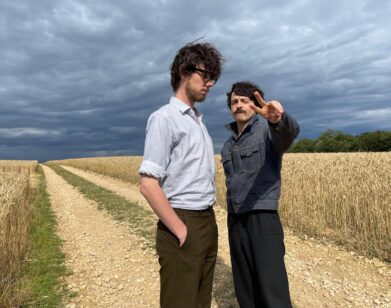Marion Cotillard
Talking about myself to someone I don’t know . . . has turned me into a wild beast when it comes to press. I’ve noticed that it’s creating something kind of out of focus about myself. Marion Cotillard
In some ways Marion Cotillard seems like a movie star out of another era, as sultry and soft-lit as a 1940s George Hurrell portrait. Maybe that’s because—at least for American audiences—she appeared fully formed in her wrenching and accomplished performance as Edith Piaf in 2007’s La Vie en Rose (for which she won an Academy Award). She arrived, in other words, not as Girl No. 1 or even Cute Female Lead, but as a fully fledged artist and star. In her increasingly varied and ambitious roles since Piaf, Cotillard has maintained that elegant allure. The characters she inhabits are adults, very often haunted by the lives they’ve lived (as the crippled whale trainer in 2012’s Rust and Bone and the gangster moll in 2009’s Public Enemies), or even by lives merely imagined (as with her tragic dreamer in 2011’s Midnight in Paris, or the purgatory-bound wraith in 2010’s Inception). Often, Cotillard’s ability to open up wounds can be almost unbearable to watch.
Fitting, then, that the 38-year-old Parisian actress should attempt literature’s most haunted heroine, Lady Macbeth, in a forthcoming Justin Kurzel-directed film adaptation of Shakespeare’s Scottish Play. Moreover, in both of her movies arriving this spring, Cotillard plays prostitutes (it’s actually the third time in a year she’s taken on the world’s oldest profession if you count her role in the music video for David Bowie’s “The Next Day“). In James Gray’s The Immigrant, out this month, Cotillard steps off a boat from Poland into 1921 New York, where she is immediately forced into the sex trade by Joaquin Phoenix‘s cruelty incarnate; and in Blood Ties, opening next month, a ’70s crime saga co-written by Gray and directed by Cotillard’s boyfriend, Guillaume Canet, Cotillard plays an addict who turns tricks to support her children.
A new mother herself (Marcel, her son with Canet, is 2), Cotillard spends her time off-set as the face of Dior and a supporter of Greenpeace. Writer and performer John Cameron Mitchell directed Cotillard in the Dior fashion films Lady Grey London (2010) and L.A.dy Dior (2011). The two became fast friends, and this past January, spoke by phone while Cotillard was in London preparing to get her hands dirty.
MARION COTILLARD: First of all, I’m so happy to talk to you.
JOHN CAMERON MITCHELL: It’s been a while. You’re in Paris right now?
COTILLARD: No, I’m in London.
MITCHELL: You’re doing Macbeth?
COTILLARD: I’m preparing it. We haven’t had the shooting yet. And, well, this is a lot of work.
MITCHELL: Yeah!
COTILLARD: Because this is something where you cannot just learn your lines and show up on set. It would be a disaster. So, yeah, we’re in the flesh. Not shooting yet, but we’re in the flesh. And where are you?
MITCHELL: I’m in New York, just getting ready for my Hedwig sequel. I’m standing over [composer] Stephen Trask and making him write. And he’s coming up with some beautiful songs.
COTILLARD: My god! You know how crazy I am about Hedwig. I’m, like, jumping on my bed right now.
MITCHELL: [both laugh] Well, it’s making me very happy. It’s been a rough time because of some family things going on, but it’s making me feel good.
COTILLARD: I know, yeah.
MITCHELL: It’s a lot of the things that happen to you in middle age. Your parents start declining; you have to think about where life goes. And that’s what the second part of Hedwig is about—the second part of your life. Do you have a special coach for the language of Shakespeare?
COTILLARD: Oh, yeah. And, it is really tough. It’s tough already for someone who speaks English. But we really tried to stick to the original text, which is inspiring because he wrote the words, but also because there is a rhythm and an energy that fits with the emotion and the purpose of what he says. But, of course, I couldn’t do it by myself. I need someone to work with; they want to keep a flavor of my French accent, because when they offered me the part, I told [director Justin Kurzel] … Well, he knew—
MITCHELL: You’re not going to be Scottish.
you don’t turn away a great director. And I always wanted to work with James Gray without thinking it was possible. Marion Cotillard
COTILLARD: [laughs] Yes. [Kurzel] thought it was interesting to have, like, an exotic flavor to the accent. So I asked, “Do you really think it’s interesting? Or do you think I will never be able to totally erase my French accent and be totally Scottish?” [Mitchell laughs] And he said, “No, no, no, we really think it’s interesting.” I don’t know if it was true, but I’m doing it, so …
MITCHELL: Well, you know they talk about the Vieille Alliance, the old alliance between the Scottish and the French.
COTILLARD: At that time, the accents and the way of speaking were totally different.
MITCHELL: Very different for everybody, yeah.
COTILLARD: So it’s not like it doesn’t make sense that I would have a weird accent. If it were set today, and we knew about my family line and everything, it would not be believable, but back then, without all the information about where she comes from, we’re going to make it work. Oh, I have to.
MITCHELL: You’re going to be great in that role; it’s such a powerful role. I always want to play the female roles in Shakespeare. And in Beckett. I’m of Scottish descent, but I want to play Lady Macbeth, not Macbeth.
COTILLARD: You could totally play Lady Macbeth.
MITCHELL: Someday.
COTILLARD: You’re one of my favorite women characters.
MITCHELL: Oh, my god! Winnie is the other female role I want to do. You know, from Beckett’s Happy Days?
COTILLARD: Of course.
MITCHELL: But Beckett doesn’t allow that.
COTILLARD: He’s gone! [laughs]
MITCHELL: I know, but his estate is very controlling. I did meet him in Paris, in 1988, before he died. I had coffee with him. It changed my life, but I was too scared to ask him if I could play his female character. He didn’t seem to like change.
I cannot speak Italian. that was my idea, actually, to have an Italian character . . . my self loves difficulties, and when my brain comes into play, it’s like, Hello! Marion Cotillard
COTILLARD: Yeah, but, you know, he wrote theater for people to take those characters and make those people their own.
MITCHELL: I feel like Shakespeare would have been fine, obviously, because wasn’t it originally a man who played Lady Macbeth? It was always boys that played the girl.
COTILLARD: Yeah, in France, it was totally the boys playing the girls.
MITCHELL: Oh, my god, so weird.
COTILLARD: But I always wanted to play a man.
MITCHELL: You haven’t yet?
COTILLARD: No, I haven’t. I mean, I wanted to play Hedwig.
MITCHELL: I know.
COTILLARD: Remember? I started to train, to have, like, muscles on my legs. It was right after I did Piaf, La Vie en Rose. I started to take singing lessons and finding where I could go. I wanted so much to do it, but after being this little old lady and, by the end, totally fucked up, the time was wrong. Piaf really took a lot of me. And then to jump right away into something that was that hard, physically. You know, I gave up because it was bad timing. It was too much to go from something super-demanding to something super-demanding.
MITCHELL: You’re always doing light, frothy roles. [laughs]
COTILLARD: Yeah, exactly. That’s exactly what I told myself when I took Lady Macbeth.
MITCHELL: You can’t help it. You love a great, strong role, right?
COTILLARD: Yeah, I think. But sometimes I wonder if I should choose, I don’t know, something that will not put me under very high stress.
MITCHELL: You must have been born with stress because all of your characters are so intense—they’re cooking, they’re under heat. [Cotillard laughs] You can’t help but make a big meal. You don’t want to make a dessert. But we had fun doing the Dior thing. That was like a dessert.
COTILLARD: I want a party!
being the same person everywhere, that’s something that I would love to feel, to achieve. But I have a responsibility in creating this person who is not someone that I like at all. Marion Cotillard
MITCHELL: You want a rock-‘n’-roll party. Well, you’re always welcome to play Hedwig if I have anything to say. You know we’re about to do it on Broadway.
COTILLARD: Yeah, I heard about that.
MITCHELL: Yeah, it’s Neil Patrick Harris, who’s very ready. We’re thrilled about him. It’s his first gigantic role on Broadway. And he’s finishing his TV show [How I Met Your Mother] after nine years and coming to do Hedwig. But we’re hoping some day we can do it with you when you feel ready. And I suppose before I get too old I have to do it one more time. I’ll do the sequel, but I probably should perform the original again.
COTILLARD: You have to do it. We have to see you in Hedwig.
MITCHELL: Oh, god, I’m feeling so old. Maybe, yeah, I don’t know. But the sequel is where my heart is right now, and it’s much stranger than the original Hedwig. So tell me, how can you be playing two prostitutes this year, Marion?
COTILLARD: Um … Yeah, that’s a question that I didn’t really ask myself. [laughs] I don’t know why this year was all about that. Because even the video that I did for—
MITCHELL: For David Bowie.
COTILLARD: Yeah—was a prostitute.
MITCHELL: [laughs] Marion!
COTILLARD: I mean, it must be the planets.
MITCHELL: The prostitution planets are aligning.
COTILLARD: Three prostitute roles in my life this year and last. I don’t know why … Not that I don’t want to do it, because why not?
MITCHELL: Yeah, why the hell not? I mean, they obviously were great scripts. You don’t turn away a great script.
COTILLARD: No, you don’t turn away a great director. And I always wanted to work with James [Gray] without thinking it was possible. And then I met him and we became friends, and, weirdly enough, when you become friends with someone you wanted to work with, it’s not that the desire disappears, but the perspective is … It’s like, when he asked me if I wanted to be part of his next movie, I was very, very surprised.
MITCHELL: You thought because you were friends you wouldn’t work together?
COTILLARD: Yeah. When I first met him, it was in Cannes in 2009. He was a member of the jury and friends with Guillaume [Canet], my boyfriend. He stopped by our hotel room and was very friendly, and I was super-impressed. I mean, it was James Gray in my hotel room. I was like, “Oh, my god, I would love to work with him.” But then we met again to have dinner and became friends, and then suddenly I didn’t think that it would be possible to work together anymore. I don’t know exactly why.
MITCHELL: It’s like having sex. You become friends and you’re like, “Oh, well, we won’t have sex anymore, probably.”
COTILLARD: It’s like, when he asked me, I had totally forgotten that it would be possible that we would work together.
MITCHELL: And what an amazing group: Jeremy Renner—so many great people, right?
COTILLARD: Yeah. Working with Joaquin [Phoenix] was something very special. He is a special actor and a very special human being. His instinct is like the instinct of an animal. There’s a pureness about him. We lost this animal instinct that we used to have. We use a very low percentage of our instinct.
MITCHELL: He uses higher percentages of it.
COTILLARD: Yeah, he’s an animal. That’s how I describe him. To be in the same area with him, I took it as a privilege. A privilege to see someone who struggles with this instinct, who doesn’t always want to trust it when it’s always right. I remember when we started rehearsing, he was about to say something, his instinct wanted to say something, but most of the time he was like, “No, no, no, this is shit.” And James would always go for what he said. I was impressed. So I started to do it as well. When he didn’t want to say something, I was like, “Please, Joaquin, say what you wanted to say.” I felt so lucky that I could work with him. And he’s very funny, too.
an actor has a huge failure in him. And this is not a weakness-this can make you strong. But it’s deep.Marion Cotillard
MITCHELL: He’s so brilliant in Her.
COTILLARD: Oh, my god, he is totally brilliant in Her. Everything he does is—
MITCHELL: Real.
COTILLARD: He takes what he does very seriously, of course, but he’s very special when he thinks he’s not. And he truly thinks he’s not.
MITCHELL: Well, they’re always cuter when they don’t think they’re cute. How was the film you did with your boyfriend, Guillaume?
COTILLARD: It was actually right after that. I just did the James Gray movie. And then I went from Poland to Italy. [laughs]
MITCHELL: Not too far.
COTILLARD: It wasn’t too far. But I cannot speak Italian. I tried already, and that was my idea, actually, to have an Italian character. I thought it made sense for this woman to be Italian. So I told Guillaume, “Why wouldn’t she be Italian?” And he thought it was a good idea. Then my brain started to function and sent me the message: “You fucker, you know you cannot speak Italian; you tried already. You’ll just have to take another lesson, more dialect coaching.” Blah-blah. Like, my self loves difficulties, and when my brain comes into play, it’s like, Hello!
MITCHELL: Right, it’s just like the prostitute thing.
COTILLARD: [laughs] Yeah, maybe.
MITCHELL: Is this Guillaume’s first film in English?
COTILLARD: Yeah, it was. I loved working with him. It was actually one of my favorite characters. She really touched me. She does everything for her kids, even if she struggles with drugs. And then she loses it and goes back to the street because she’s using again. But this fight for her kids really moved me. And, of course, it’s because I became a mom myself.
MITCHELL: How is your baby doing?
COTILLARD: He’s really good.
MITCHELL: He’s not an actor yet, I hope.
COTILLARD: Ah, it’s an amazing job, but my parents never told me anything about how hard the job would be. My parents were actors too. I don’t even know if when I wanted to be an actress, they went, “Oh, shit.” [laughs] I must ask them. I mean, an actor has a huge failure in him. And this is not a weakness—this can make you strong. But it’s deep.
Working with Joaquin was something very special . . . His instinct is like the instinct of an animal. There’s a pureness about him. We lost this animal instinct that we used to have. Marion Cotillard
MITCHELL: What do you mean that they “have a failure”?
COTILLARD: Maybe failure is not the right word. Something deep inside which is broken.
MITCHELL: There’s a hole, or a wound. Something missing.
COTILLARD: Yeah. It might be missing. And most of the time I think if you don’t have this, you’re not a good actor. [laughs] So it’s kind of a struggle. I mean, if my son wants to be an actor, it’s fine.
MITCHELL: Is he telling you something’s missing?
COTILLARD: To be a great actor, you must have this. And I don’t want him to have it!
MITCHELL: But maybe every artist has a little something …
COTILLARD: Yeah, every artist. You’re right. And it’s a beautiful thing. It’s a beautiful thing to deal with this … Failure is a good word or not a good word?
MITCHELL: I think maybe not failure … I don’t know what it is. Something that’s missing.
COTILLARD: Translation in French would be fault.
MITCHELL: More like a fault in tectonics. Like an earthquake. Like a crack.
COTILLARD: Yeah. Something that is broken in some way. And it’s beautiful to deal with this broken insides through art. I think it’s one of the best ways.
MITCHELL: It’s funny, when I was a kid, I moved around a lot, and I had to change myself to fit it—change my accent, change my personality, and also being gay and hiding it. So I became an actor very young. And it wasn’t a surprise when it became a job. It wasn’t my first love, because my first love is writing. But acting was fun, and it was collaborative, and I could make a living. And I did it well because I learned it my whole life. But my goal was I wanted to be the same person everywhere. Same person with my mother as with my lover, as with my friend, as with my son. I wanted to be the same person, because I didn’t know how to do that, you know? That’s still my goal. Even though I don’t act as much, I want to try to be the same person when I’m dying as when I’m having an orgasm, as when I’m being interviewed. [both laugh] Which is, of course, a disaster for acting, but maybe good for the soul.
COTILLARD: Yeah, being interviewed, that’s one of my problems. Talking about myself to someone I don’t know, and knowing that most of the time they will interpret in a bad way what I’m saying, has turned me into a wild beast when it comes to press. I’ve noticed that it’s creating something kind of out of focus about myself. But, in a way, I don’t really care, even if sometimes I feel that the person being put out there is so far from who I am. As you said, being the same person everywhere, that’s something that I would love to feel, to achieve. But the thing is, I have a responsibility in creating this person who is not someone that I like at all. [laughs]
MITCHELL: Yeah.
My parents were actors too. I don’t even know if when I wanted to be an actress, they went, ‘Oh, shit.’ I must ask them. Marion Cotillard
COTILLARD: Two years ago I finally accepted that I was not an awful writer. I always thought that I was a terrible writer. And I started to write songs. And I started to like what I was writing. I think it’s a new way for me to express things that are closer to myself than when I play a role, because, of course, it’s really not me. I’m finding a new way. I don’t know what it’s going to be. But I know that I will need to give it to people one day.
MITCHELL: You’ve been performing with [French singer-songwriter] Yodelice lately?
COTILLARD: When I was on tour with him, yeah, I played a little bass guitar or drums or keyboard, and I would sing. But I’m not a real musician. If you give me a bass guitar and you ask me to improvise something, or even be with some musicians and follow them, I wouldn’t be able to do it. And I want to change that. I want to be able to be in a group and take my guitar and play with them, without someone showing me, “Okay, you’re going to do this and that,” because music has always been a big part of my life. I couldn’t live without music. I experienced things through music in different countries where you cannot speak the same language, but the music and the dance relates everything.
MITCHELL: So universal—music and sex.
COTILLARD: Yeah. Some friends sent me a link to this amazing lady—she was Jewish and was in a camp, and she was saved because she was a pianist. And there’s an interview with her. She’s, like, 104.
MITCHELL: Wow. Still alive?
COTILLARD: I don’t know, because I don’t know when the video was shot. She was about 40 when the Nazis took her. So I guess she’s gone now.
MITCHELL: She must be gone. Oh, is it Alice Herz-Sommer?
COTILLARD: Yes!
MITCHELL: I just looked her up online. I’m seeing her video.
COTILLARD: Before I heard her talk about music, I was still wondering if I would share my music, if I really would go into music. And then I saw this and was like, “Okay, yeah, this is a sign that I have to pursue it, that I have to just go for it.”
MITCHELL: She’s 110 years old. She’s so beautiful. Look at that smile!
COTILLARD: You should watch the videos of her just talking about music. Music literally saved her.
MITCHELL: Because she could play and they would allow her to live.
COTILLARD: Because she could play.
MITCHELL: Do you know, Marion, I had a lady living above me who was a Holocaust survivor, and she had her yellow star on her refrigerator with a magnet. You never want to be rude, but she was very funny and fun, and I would ask her about what happened. And she said, “I survived because I was beautiful, and I’m not proud of it. And I have to live with that guilt. Because it was nothing else but something that fades.” A lesbian woman helped her, hid her on a farm in France, and a guard let her get away in Germany. She separated from her boyfriend and got to New York after the war and met him and married him. Unbelievable. She didn’t want to talk about the war; she wanted to talk about the other Jewish ladies in our apartment building, who she hated. [Cotillard laughs] It was like, “I don’t want to talk about Lucille. She was a drunk and a whore, and she tried to get me thrown out of my apartment for having a black friend. And she hates me for remembering her sins!” I just wanted to document her, but she was tired of people interviewing her, just like you.
COTILLARD: Well, it’s not the same when it’s like that.
MITCHELL: I know, as when it’s their real life. Oh, honey. Well, I wish you the best with Lady Macbeth. Don’t let her make you crazy. Wash your hands every night after working. Get that blood out.
COTILLARD: I’ve been washing my hands 10 times a day.
MITCHELL: A modern Lady Macbeth washes her hands a lot but she also moisturizes.
COTILLARD: I do!
MITCHELL: Don’t forget to moisturize.
JOHN CAMERON MITCHELL IS A NEW YORK-BASED ACTOR, WRITER, AND DIRECTOR. HE IS CURRENTLY SUPERVISING A BROADWAY REVIVAL OF HEDWIG AND THE ANGRY INCH DEBUTING THIS MONTH.

